One of the more common menopausal symptoms women experience is known as “brain fog.” Many woman may not know it by this name but this was one of the most disturbing symptoms for me as I went through menopause. Around 60% of women will experience some form of brain dysfunction as they go through the hormonal shifts of perimenopause. 1
This can be experienced as:
- Forgetfulness
- Unstable moods
- Irritability
- Difficulty making decisions
- Difficulty learning new tasks
- Lack of focus
- Confused
- Lack of mental clarity
How Real Is This problem?
Some theorize that it is the distraction of having hot flashes, fatigue, poor sleep, or secondary to other symptoms. Some chalk it up to stressors that occur in midlife, like teenagers, elderly parents, job stress, relationship issues, and more. But it studies show that there are real cognitive changes happening that are separate from other symptoms and even measurable.(2)
In most women, it is a mild loss of sharpness and is annoying. Some find it more severe and fear they are developing early dementia. For some it is mild, but for many it may be a struggle that affects everyday life and may be a big deal. If you have brain fog and have never had it before, it is is very unsettling and undermines your confidence to function as required. It may improve over time as the brain adjusts to the lower estrogen levels, but it is not predictable how long that can take or if everything will come back to the previous levels.
Why Is The Brain Affected?
There are quite a few estrogen receptors in the brain and they tend to be clustered in certain areas. (3) One of these concentrated areas is in the prefrontal cortex. This is the part of the brain just behind your forehead and it is known to be involved in executive functioning, like making decisions or solving problems. It also impacts processing speed.
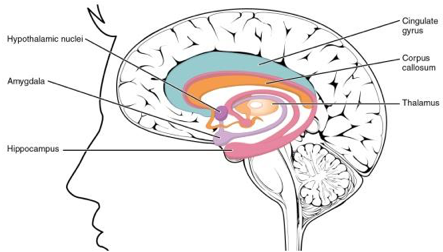 There are also increased estrogen receptors in the amygdala and the hippocampus, areas of the brain where we process emotions. Estrogen has long been observed to decrease anxiety and depression, so lack of it can worsen these.(4) This makes a lot of sense that during times of shifting hormones, like menopause, perimenopause, pregnancy, post-partum periods, and teenage years, mood changes such as irritability, depression, crying easily, and mood swings are common symptoms.
There are also increased estrogen receptors in the amygdala and the hippocampus, areas of the brain where we process emotions. Estrogen has long been observed to decrease anxiety and depression, so lack of it can worsen these.(4) This makes a lot of sense that during times of shifting hormones, like menopause, perimenopause, pregnancy, post-partum periods, and teenage years, mood changes such as irritability, depression, crying easily, and mood swings are common symptoms.
Chemical Messengers
Another way to look at the effects of estrogen on the brain is to understand how it works with neurotransmitters. These are chemicals that are needed to send messages from one brain cell (neuron) to another brain cell. Nerve signals travel through a cell by electrical energy, but to cross the synapse (the gap between neurons) 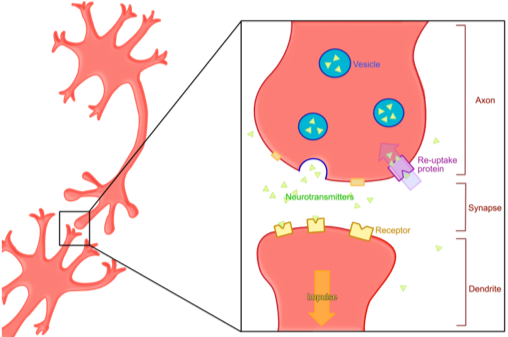 the message is transmitted chemically. There are many neurotransmitters in the brain, but two of the common ones most affected by estrogen are serotonin and acetylcholine.(5)
the message is transmitted chemically. There are many neurotransmitters in the brain, but two of the common ones most affected by estrogen are serotonin and acetylcholine.(5)
Many people have heard of serotonin in relationship to depression and anxiety because it is important in controlling mood and emotions. Estrogen affects the serotonin system and therefore effects mood. This is not a surprise to anyone who has ever been pregnant or around a pregnant woman. Hormones are well known to affect mood.
Selective Serotonin Reuptake Inhibitors (SSRI) are medications prescribed for depression and anxiety. This class of drugs includes Prozac, Zoloft, Paxil, Celexa, and more. There is a common practice in modern medicine to prescribe these medications, rather than treat the underlying estrogen deficiency. But that practice ignores what is really happening in the brain.
Another critical system that most of us are less familiar with is the cholinergic system which are pathways that use acetylcholine as a neurotransmitter.
Acetylcholine plays a vital role in:
- Memory
- Attention
- Ability to learn new things
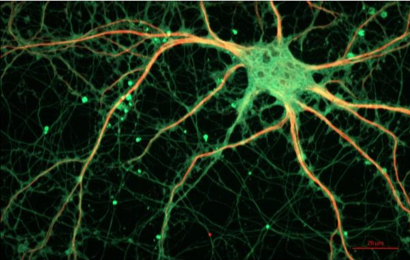
If both the cholinergic system and estrogen are suppressed experimentally at the same time, there is a significant decrease in verbal memory.(6) Estrogen affects the cholinergic pathways and this is believed to be one of the mechanisms by which estrogen affects memory.
Encouraging New Brain Connections
Estrogen is also known to be “synaptoblastic.” That means it helps neurons grow new branches and make new connections (synapses) with other neurons.(7) Declining estrogen levels, as happens during menopause, decrease our ability to make these new connections within the brain. This means it can be difficult to learn new tasks and the brain has to make some choices about what it is going to let go and what it is going to keep. If it is limited on new growth, it cannot keep everything. For example, you may not remember to call that friend back that you spoke to yesterday, but your brain will remember how to drive or where you live. Vitamin D is an example of another hormone that is synaptoblastic (8) and can play a significant role in brain health. Check out my article Vitamin D and the Hormonal Connection on how to make sure you are getting enough Vitamin D.
Is There Help For Brain Fog?
Yes, there is hope! Even though some studies say that hormone replacement does not help brain fog, there is evidence to the contrary.(9) The reason that studies results may not be consistent on this is that 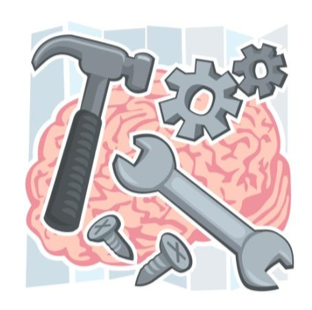 there is a window of opportunity early in menopause to bring help.
there is a window of opportunity early in menopause to bring help.
Hormone replacement in the years closest to cessation of menses showed the best improvement in cognitive skills. If the hormones were introduced beyond this window, there was no effect or even a negative effect.(10) One theory is that the brain cells decline and become damaged due to the lack of neurotrophic factors (supportive factors that feed the neurons) like estrogen. If the cells are not yet damaged, supplementation of the estrogen levels in the early menopausal woman can restore function. If the cells are beyond repair, it is too late, and there is no response to the estrogen. (11) Severely damaged neurons may react in ways to seem to make the problem worse. Fortunately, for me, I was supplied estrogen replacement within months of stopping menstrual periods, and my brain felt restored with the first dose!
What About Dementia?
Good news for women! There does not seem to be 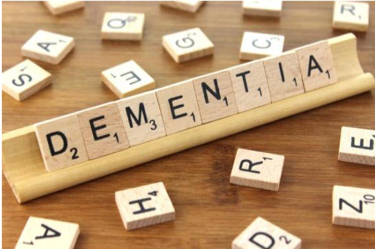 a strong correlation between getting brain fog in menopause and developing dementia later. The most exciting news is that early use of bioidentical estradiol, our primary estrogen, slows cognitive decline. (12) The Women’s Health Initiative (WHI) was a large study that used Premarin (equine conjugated estrogens from the urine of pregnancy mares) or PremPro (Premarin plus medroxyprogesterone) and it showed an increase in dementia when hormones were given to women over 65. (13) However, many researchers wanted to understand this better and set up other trials.
a strong correlation between getting brain fog in menopause and developing dementia later. The most exciting news is that early use of bioidentical estradiol, our primary estrogen, slows cognitive decline. (12) The Women’s Health Initiative (WHI) was a large study that used Premarin (equine conjugated estrogens from the urine of pregnancy mares) or PremPro (Premarin plus medroxyprogesterone) and it showed an increase in dementia when hormones were given to women over 65. (13) However, many researchers wanted to understand this better and set up other trials.
One of those trials, done at Stanford University School of Medicine is showing that use of estradiol, our natural estrogen, given close to menopause, shows a significant slowing of cognitive decline, that means it is protective against dementia. Specifically, women on Premarin did not do as well as women on bioidentical estradiol. Furthermore, in WHI, the women on synthetic progestins, like medroxyprogesterone (Provera) had the worst outcomes. (14) This reinforces the need to stick to bioidentical hormone replacement, such as estradiol and natural progesterone to get the benefits. It also shows us to take advantage of the window of opportunity and use the hormones earlier rather than waiting. You can read more about Bioidentical hormones in my article 7 Myths About Hormone Therapy.
Longer use of hormone replacement therapy was also associated with decreased risk of dementia and less shrinkage of the brain.(15)
Other Hormones And The Brain
In addition to estrogen, other hormones also have brain receptors.
- Low testosterone levels are associated with brain fog in men. Adding a little testosterone to bioidentical hormone replacement can boost mental clarity in women as well.
- Progesterone is known to promote neuroplasticity, the ability of the brain to adapt and repair. Some are studying using this in traumatic brain injuries. (16)
Other Causes Of Brain Fog
A good medical provider can also help rule out other factors that may contribute to poor brain function, by themselves, or in conjunction with declining estrogen levels. These may include:
- Low thyroid function
- Vitamin deficiencies, like B12 or D
- Omega-3 deficiency
- Poor diets with excessive sugars, caffeine, gluten, chemical additives, etc.
- Drug fogged brain (pain killers, antidepressants, anticonvulsants, antihistamines, chemotherapy, statin drugs, tranquilizers, etc.)
- Lack of sleep (sleep apnea, insomnia, overuse of stimulants, etc.)
- Lack of exercise
- Chronic stress
- Chronic inflammation or infections
- Autoimmune diseases
Take care of yourself!
If you are suffering from menopausal brain fog, there are many things you can do to help.
- Get plenty of sleep
- Get regular exercise
- Eat whole, healthy foods
- Consider a vitamin B complex and vitamin D
- Eat sources of omega-3 fatty acids or take a high quality supplement
- Learn to moderate stress levels
- See a knowledgeable provider who can help you with bioidentical hormone replacement in a timely manner!
If you have brain fog I recommend finding a functional medicine practitioner to work with to identify why you are experiencing brain fog and address the cause.
Now I want to hear from you. Have you experienced brain fog? If so, what did your doctor recommend? Has it been effective? What else have you tried? Please share your comments below.




